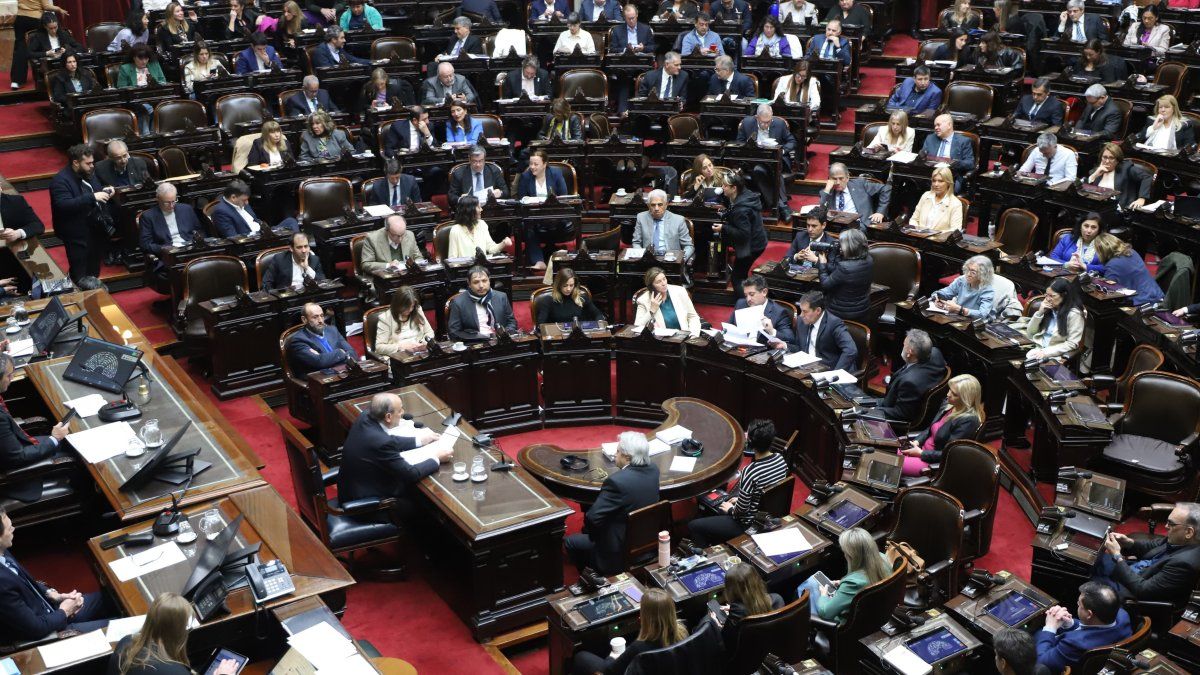At least a dozen deputies of the UCR would reverse its vote tomorrow to defend the veto of Javier Milei to the retirement mobility law. The opposition blocks do not reach 155 votes to reject the presidential veto tomorrow in the chamber of the Chamber of Deputies and, if a quorum is achieved, they would barely have a majority to summon the Budget and Finance Committee of José Luis Espert to begin analyzing the issue next week. Meanwhile, the veto on the improvement of pensions remains in force.
To ensure a rejection of the veto, the UCR, Federal Meeting, Civic Coalition and Union for the Homeland They should total at least 170 votes, that is, two thirds of the Chamber. That number is far away today. That is why a short session is expected, where the opposition would achieve a quorum with 129 deputies but would not reach the two-thirds of those present to enable the rejection of the veto to be dealt with on the spot. In that scenario, the veto would be referred to committees with a slow process that would aim to make the Casa Rosada pay the political cost of the measure that denies an 8.1% pocket improvement for retirees.
Voting in the House of Representatives
In the Chamber of Deputies, the vote in favor of the retirement mobility law had obtained 160 votes in favor and 72 against, with 16 absent and 8 abstentions, which means that the Casa Rosada is 13 votes away from being able to shield the veto in the lower house. But the absences and abstentions, especially in the UCR, will play a key role. The votes do not obey so much the leaders of the Congress block but rather the governors who, urging funds in their districts, open parallel negotiations with Javier Milei in the framework of the arrival of the 2025 Budget to the Chamber of Deputies.
To top it off, yesterday the UCR deputy for Entre Ríos Rodolfo Galimberti He notified his resignation to the authorities of the lower house and will be sworn in at the next session to take office. Nancy Ballejos, who will swell the ranks of the PRO bench. A vote in favor of Milei. The change harms the radicalism, which loses a seat, and benefits the block presided by Cristian Ritondo, which thus grows to 38 members and separates itself from La Libertad Avanza (LLA), which with the departure of Lourdes Arrieta was reduced to 37 representatives.
What will the session in the House of Representatives be like?
The roadmap for tomorrow’s session in the House of Representatives to try to reject the veto on retirement mobility will be as follows:
1. First, 129 deputies will have to be seated to enable a quorum. This number would be guaranteed by the opposition ranks, which, however, are far from adding two thirds of the votes to enable the treatment on the table and then reject the veto in the chamber.
2. It is expected that once the quorum is achieved, La Libertad Avanza, PRO and allies will join forces to block the two-thirds and request that the veto be sent to the plenary session of the Budget and Finance and Social Security and Welfare Committee. That is, to summon Espert to issue an opinion in view of the lack of a call to his committee.
3. Another scenario would be that La Libertad Avanza, PRO enable the treatment on the spot, taking into account that the opposition is not even close to two-thirds. In this way, they could vote in favor of the veto, block the two-thirds and the veto would become final without the need to be debated in the Senate.
Javier Milei’s veto
The vetoed project contemplates granting an additional 8.1% to compensate for January’s inflation, since the Government had granted 12.5% and the CPI for that month was 20.6%, and that is the point that the National Government mainly rejected with the argument that it will affect its zero deficit policy. It also establishes, like the Government’s DNU, to increase pensions according to the Inflation Index, but it establishes that an additional increase will be given in March of each year, but there are differences between the percentages granted and the average of 50% of salaries according to the Ripte.
It also states that “Additionally, in the month of March of each year the following increase will be applied: fifty percent (50%) of the variation in the Average Taxable Remuneration of Stable Workers (RIPTE) “over the variation in the Consumer Price Index (CPI) in the previous calendar year. If this variation was not positive, no adjustment will be applied and the calculation for the following year will be based on the last index used.”
It also establishes a mechanism for paying the debt with the pension funds, which determines that the debts with the provincial pension funds must be paid with the resources obtained from taxes that have a specific allocation for ANSES, as well as the payment of final judgments within six months of the law being passed, although in this case there will be a six-month extension.
Source: Ambito
I am an author and journalist who has worked in the entertainment industry for over a decade. I currently work as a news editor at a major news website, and my focus is on covering the latest trends in entertainment. I also write occasional pieces for other outlets, and have authored two books about the entertainment industry.




